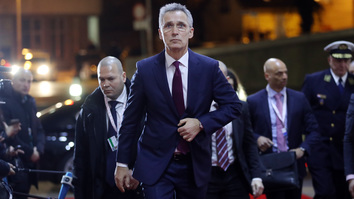BRUSSELS -- NATO Secretary General Jens Stoltenberg Tuesday (July 27) pledged continued support for Afghanistan and reiterated calls for a "negotiated settlement" with the Taliban as the insurgents crank up their violent assault on the country.
"The security situation in Afghanistan remains deeply challenging, and requires a negotiated settlement," Stoltenberg wrote on Twitter after speaking to President Ashraf Ghani.
"NATO will continue to support Afghanistan, including with funding; civilian presence; and out-of-country training."
Violence has surged since early May, when the Taliban launched a sweeping assault just days after US and NATO forces began a withdrawal that now is almost complete.
The deadly advance has seen the insurgents capture scores of remote districts and border crossings and encircle several provincial capitals.
The fighting continues across the rugged countryside as peace talks between the Afghan government and the Taliban so far have failed to reach a deal to end the war.
Most of NATO's 10,000-strong force already have pulled out of the country.
High civilian deaths feared
The United Nations (UN) Monday warned that Afghanistan could see the highest number of civilian deaths in more than a decade if the Taliban's offensives across the country are not halted.
During the first six months of 2021, some 1,659 civilians were killed and another 3,254 wounded -- a 47% increase compared to the same period last year, the UN Assistance Mission to Afghanistan (UNAMA) said in a statement.
The rise in civilian casualties was particularly sharp in May and June -- the initial period of the Taliban's current offensives -- with 783 civilians killed and 1,609 wounded, it added.
There is "growing evidence" the Taliban are committing atrocities against civilians in areas they have captured -- including in Spin Boldak, the town near the border with Pakistan that they took earlier this month, Human Rights Watch (HRW) warned last week.
"Taliban leaders have denied responsibility for any abuses, but growing evidence of expulsions, arbitrary detentions and killings in areas under their control are [sic] raising fears among the population," Patricia Gossman, associate Asia director at HRW, said Friday.

![A member of the Afghan security forces stops a vehicle at a checkpoint in Herat on July 24 as a night curfew was imposed across 31 of the country's 34 provinces to curb surging violence unleashed by a sweeping Taliban offensive in recent months, the Interior Affairs Ministry said. [Hoshang Hashimi/AFP]](/cnmi_st/images/2021/07/27/30914-000_9g32ul-585_329.jpg)







If NATO’s secretary general has any sympathy with the Afghan people, he should launch serious attacks on the Taliban and he should close the Taliban office in Doha, Qatar, because the Taliban are not talks-loving people, and they didn’t mean to hold talks in the first place. The Taliban are a Pakistani project and if we want the war in Afghanistan to end, we must hold talks and reach an agreement with Pakistan. When we resolve the issues with Pakistan and achieve a solution, the war will end automatically. #TalkSeriouslyWithPakistanToEndTheTalibanProject
Reply2 Comment
The United Nations can put an end to Afghanistan's problem. It must put pressure on the world's powerful countries, including Saudi Arabia, Russia, China and Pakistan, to cooperate sincerely in the Afghan peace process, because Afghanistan's problem will not be solved through war. Neither the Taliban nor the Afghan government can bring peace to the country through war, because for 40 years, many wars were fought in this country and various systems were established by force and militarily in Afghanistan, but a lasting peace did not come in Afghanistan. Therefore, all groups and parties, including the Taliban, must come together and create a system that is acceptable to all in Afghanistan, so that a lasting and stable peace comes in Afghanistan and the ground for war is no longer paved in the country.
Reply2 Comment